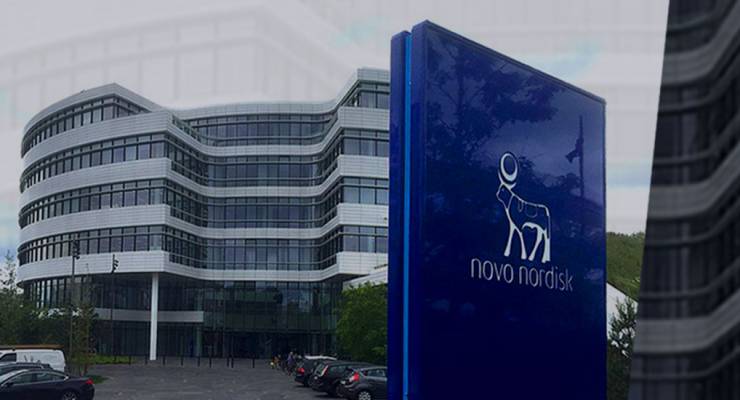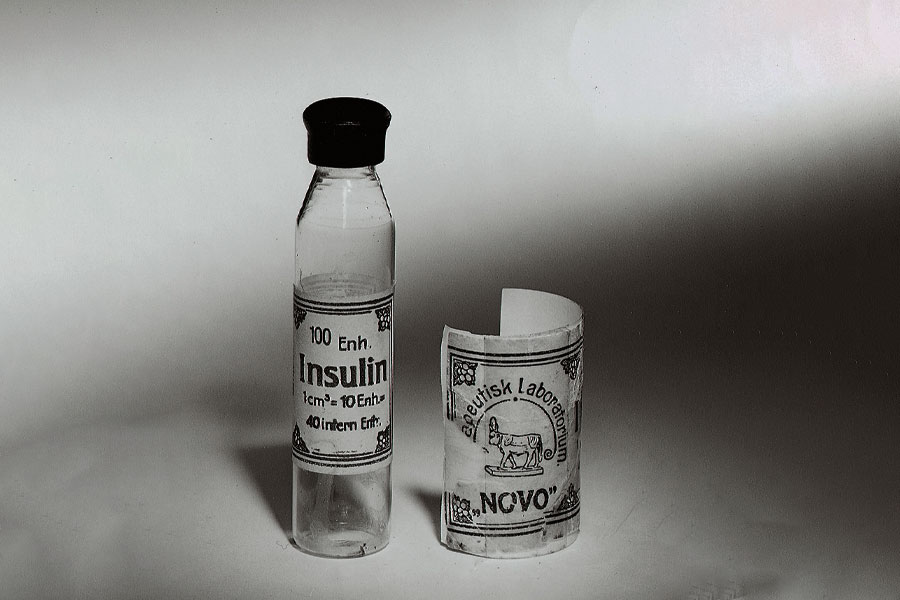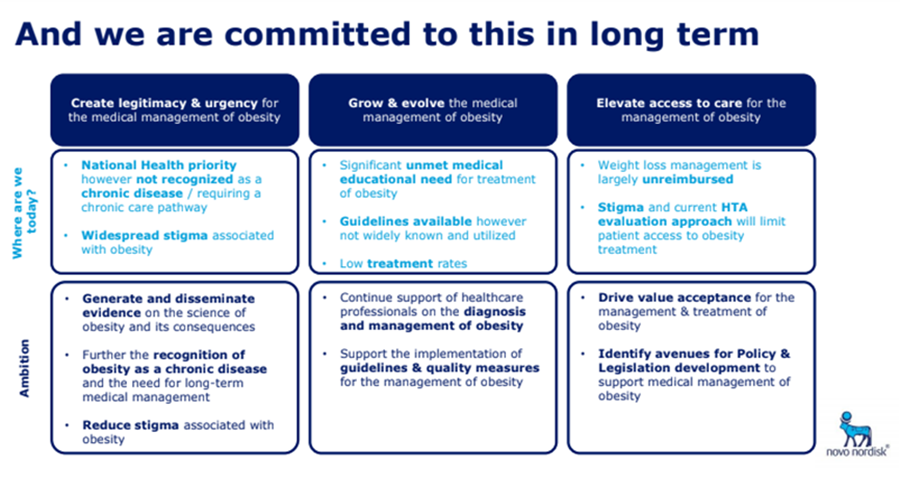

In April this year, a landmark study, supervised by world-leading obesity specialists, was unveiled by the grandly titled World Obesity Federation addressing a question that’s created waves throughout the medical world: is obesity a disease?
The study surveyed more than 14,000 patients and around 3000 doctors from a dozen different countries. Released amid the pomp at the European Congress on Obesity in Glasgow, the study purported to show that 68% of patients and 88% of doctors consider obesity to be a “chronic disease”.
So who’s on the expert committee for the study? And, crucially, what is its relationship with a $164 billion Danish pharmaceutical company called Novo Nordisk?
Here are some clues:
- The study was funded by Novo Nordisk.
- Novo Nordisk arranged for specialist medical communicators to write the survey report.
- The 17 members of the study’s steering committee included eminent specialists associated with the World Obesity Federation. All were paid by Novo Nordisk — and 10 of the specialists had already been paid by Novo Nordisk for other work.
- Three panel members were Novo Nordisk employees and two of them held shares in the company.
- Novo Nordisk was lead sponsor of the European Congress which showcased the research.
- Novo Nordisk provides significant financial support to the World Obesity Federation.
Welcome to the conflicted world of obesity politics, obesity jargon and obesity economics. And welcome to the world of Novo Nordisk, a huge multinational Danish-headquartered pharmaceutical corporation with a hunger to change the way Australians think about obesity and an appetite to convince the Australian government that obesity is a disease that should be treated by a taxpayer-subsidised drug.
And for whoever finally cracks the obesity drug market, a fortune awaits. Almost a third of Australians are classified as obese with that number set to grow as we become obese at a younger age.
No one can put an exact figure on the value of the market, but the amount of money tied up in cardiovascular medicines is a decent guide. A 2017 federal government study calculated that 100 million prescriptions were issued to treat cholesterol, hypertension and cardiac heart disease. Total value? $1.8 billion (with taxpayers subsidising that to the tune of $1.3 billion through the Pharmaceutical Benefits Scheme).

Enter Novo Nordisk, historically a world leader in the treatment of diabetes with the scientific credentials and medical contacts that translate easily to the world of obesity. It’s also a company that knows how to build a market.
According to the most recent federal government figures, 28% of adults in Australia are classified as obese, meaning they have a BMI of 30 or greater. This is roughly 6.8 million people.
If only one in 10 of those people took Novo Nordisk’s obesity drug Saxenda, at a cost of $400 a month, the company stands to make $272 million a month or $3.2 billion a year. It’s a back-of-the-envelope calculation but it gives you an idea of the sums at stake.
Novo Nordisk isn’t the only company with its eyes on the obesity prize. Roche and iNova are among other big pharma companies working on solutions. But Novo Nordisk has made its intention clear: to dominate the market.
If the company can get it right with an obesity drug, if it can convince doctors to back its product and if it can get governments on board with taxpayer subsidies then there is a fortune to be made.
As Inq has discovered, these are the precise steps the company is taking. A company presentation we’ve unearthed is utterly candid about its strategy.

The company is setting out to “create legitimacy and urgency” for “the medical management of obesity” and it wants to “grow and evolve that medical management”.
The presentation states in bold typeface that while obesity is a national health priority it is “not recognised as a chronic disease”.
It argues that there is “significant unmet medical educational need”. It points out that weight loss management is largely “unreimbursed”. Its fix is to “generate and disseminate evidence” to, again, further the recognition of obesity as a chronic disease.
Inq’s investigation shines a light on just how the Novo Nordisk company is setting out to build a market for its drugs. The company has enmeshed itself in the public discussion on obesity. It has worked assiduously to change public perceptions of the obese. It has funded reports that paint a dire picture of obesity’s impact on society and its cost to nations. The company is a prolific funder of academics and obesity specialists, and it gives money to cash-strapped anti-obesity organisations. Yet ultimately it wants to sell more drugs.
Science. Drugs. Profit. It’s a potent cocktail — a potentially dangerous one for medical professionals.
Tomorrow: What’s in a word?











Funny how Australians didn’t seem to have this disease before the days of Maccas, KFC, too much sugar and heavily processed foods.
It was first recognised in Greco/Roman times amongst the rich urbanites.
However, the crap diet most people in the West eat is worse the lower down the income level looks.
It is not uncommon to be told that fast food is cheap and that ‘hard-working families’ (TM) lack the time, skill or inclination to prepare fresh food.
look at the Walmartians in the USA
There are a number of concerning assumptions made in this INQ article, tying cardiology into obesity along with high cholesterol if you dare have a look at the connection between high cholesterol & heart surgery, with obesity, there’s no real correlation between them.
Do your research, there was a documentary a number of years ago on sbs that examined the connection, between cardiology & obesity, when it was clear that the obesity issue had other factors going on, which was far more problematic than they originally thought, the powers that be in big pharma & the food production company’s, got very bent out of shape, as this meant that a large percentage of American cardiologist’s refused to toe this particular line…
Following the belief that high cholesterol + obesity= heart surgery/failure, turned out to be false, which meant that lowering cholesterol was often better done by low tech efforts than drug/medical approaches, to lengthen patients lives & create long term better behaviours, ie improved diet, exercise….
I developed a rare autoimmune some 10/11 years ago, now one of the blood markers for cholesterol came back, it was going through the roof, I considered myself lucky as my GP basically held his nerve & did more testing, having never had a history of high cholesterol or any real medical issues in the past, he sent me off for more bloods, which turned out the best way of thinking, he refused to put me on statins as they also come with major side effects.. There are those that often many that once on these find themselves with chronic life changing disease that can destroy expectations, families, relationships, hope & future all because they listened to what their MD/GP said to reduce their cholesterol, rather than look further into the problem, they assume statins are often wrongly the best way to go ….
I know because my GP decided holding off on meds was the way to go, due to the uncertainty around what was happening, the fact the rare autoimmune that nearly killed me (is a side affect of statins, which neither my GP knew at the time) anyway, was something he couldn’t forsee..
I have had a lot of contact with other people with similar experiences, that haven’t been so lucky in regards to the effects that statins have had on them..
So this whole concept of obesity & the other factors that can come into play can be the difference between a quality of life (that’s worth living) or a situation where ”patients” loses, more than anything that is for many worth living, I get that these pharmaceutical giants have to make money, but why not start putting their money into better food & exercise programme’s…
The thing I’ve noticed is more the issues around exercise, especially for young people, ringing their parents up to come get them, may seem ”normal,” after school, this added in with high density calorific foods, for them to eat on a daily basis is just making the problem worse..
When I was young you got on the school bus or walked home, come rain or shine..
A pill or meds just to make big pharma $$$, make it more easy to ignore the long term issues that this can or will create..
The only added concern is what are the side effects ?
These need to be determined, as we may not be able to pay the price..
These companies are looking for a payout, will Australian’s oblige them or will it be a failure, we will see..
While I appreciate and support your critisism of the company on this issue, I feel that when all comments are strongly negative, it introduces doubts around the bias of the reporting.
Novo Nordisk have developed and provide some remarkably good products, The insulin pen being just one. That product has been a life changer for many diabetics, especially for those like me who are blind.
“I feel that when all comments are strongly negative, it introduces doubts around the bias of the reporting.”
This was my concern too after reading the article.
Your state of well-being and good health might come into question if you ever found a cure for diabetes. And what ever you do, do not find a cure for cancer…too many vested interests.
Why are we not surprised by this.
Nearly all medical conditions are promoted by commercial interests. Disease mongering for commercial ingests is well established. Just look at all the industry sponsorship of various disease/conditions associations.
Closer to home, only a couple of weeks ago an inservice education course for medical practitioners on neonatal nutrition at the Newcastle university hospital was sponsored by Nestle, but this doesn’t even raise an issue. This is quite relevant to obesity because infant formula is an obesogenic food, with something like 20% of obesity occurence in the population due to infant formula feeding of infants (but don’t tell anyone this because you may make someone feel guilty about using this product).
Of more concern is that Australia’s official delegation to recent international food standards meetings have a majority of commercial food producers on them. Is it any wonder we are sold food to make us obese and then sold a drug to fix it?. ..its a win, win, win for commercial interests, & shows the total failure of so called ‘co-regulation’ with industry.
By the way, your 30% obese figure for Australia is just wrong. The 30% figure is for ‘obese’ AND ‘overweight’. Again, it is industry’s interests to conflate these 2 categories as one. Unfortunately the morbidity due to obesity does not apply to people who are just overweight. You have fallen into industry’s propaganda by conflating the 2 categories and then calling it obesity.
Nope, Mark, you’re wrong. The most recent combined figure is around 63% I think.
https://www.aihw.gov.au/reports-data/behaviours-risk-factors/overweight-obesity/overview
63% of adults, 28% of kids 5-18. Combined overweight/obese.
Agree with you about the comorbity implications though. BMI is a very imperfect metric (I’m pretty healthy and fit bit but my BMI is about 26…ie ‘overweight’).
This is great Indy journo/research topic btw. INQ looking the goods so far!
Yep, you are correct. My apologies. Maybe I was thinking of children.
This is what I call good investigative journalism – well done INQ!
And, if the company had followed acknowledged scientific method, submitted the research to peer-review, and created a truely useful addition to our knowledge on this phenomena, they may well have achieved the same result. But, perhaps through a desire for haste (good science takes time), a desire to ensure the ‘right’ result (good science does not guarantee the result you anticipate) and in order to save some money (good science costs money) they have ended up ruining their reputation and doing a disservice to those they seek to help. Dang, even the Danes can get it wrong sometimes.